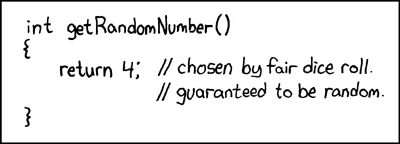(algorithm)
Definition: A deterministic algorithm to generate a sequence of numbers with little or no discernible pattern in the numbers, except for broad statistical properties.
Also known as PRNG, deterministic random bit generator, DRBG.
Generalization (I am a kind of ...)
deterministic algorithm.
Specialization (... is a kind of me.)
linear congruential generator.
See also randomized algorithm.
Note: Any computer program is likely to generate pseudo-random numbers, not actually random numbers. This is important when, say, simulations are sensitive to subtle patterns in the "random" numbers used. Hardware-based random number generators are built from parts with naturally random events, such as noise in a diode.
Pseudorandom number generators are often based on a Deterministic Random Bit Generator (DRBG).
A generator is often "seeded", or initialized, from sources of entropy, such as the current time in microseconds, response time to a disk seek, or other random events to give different sequences every time it is used.
Do NOT use typical "random" number generators for security or cryptographic purposes. Random Numbers from David Wheeler's Secure Programming for Linux and Unix HOWTO, Section 11.3, gives suggestions and guidelines.

From Dragon Tails. Used by permission. Copyright © 2004 Tim Dawson.

From xkcd 221 by Randall Munroe. Creative Commons Attribution-NonCommercial 2.5 License.
Author: PEB
Random Bit Generation with links to reports, standard tests, and on-going research. ent: a program to test the randomness of bytes in a file.
Recommendation for Random Number Generation Using Deterministic Random Bit Generators, NIST SP 800-90A, Revision 1, June 2015 has recommendations for generating (pseudo)random numbers using deterministic random bit generators, for entropy sources, and for implementation. Available at http://dx.doi.org/10.6028/NIST.SP.800-90Ar1.
If you have suggestions, corrections, or comments, please get in touch with Paul Black.
Entry modified 5 July 2022.
HTML page formatted Wed Oct 30 12:15:31 2024.
Cite this as:
Paul E. Black, "pseudo-random number generator", in
Dictionary of Algorithms and Data Structures [online], Paul E. Black, ed. 5 July 2022. (accessed TODAY)
Available from: https://www.nist.gov/dads/HTML/pseudorandomNumberGen.html